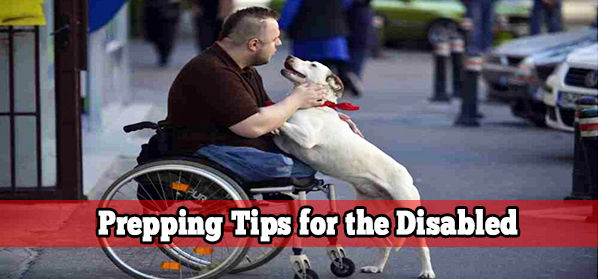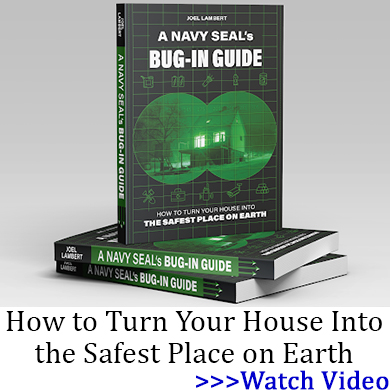Whoever said a disabled person can’t prep like a pro didn’t know what he was talking about. Indeed, if you have a physical impairment, that shouldn’t stop you from fighting for your life. After all, that’s what survival is: fighting tooth and nail to live to see another day. Granted, the types of disability you or a loved one have are varied. Inability to walk, ruptured disks, blindness—these all influence the things you can do to prepare.
Allow me to give you a few quick suggestions of things to do in your situation. I won’t go too deep into them because there’re plenty of articles doing that.
Tip: You may want to read this even if you aren’t disabled right now. There’s always the possibility that you’ll become so during or after a disaster.
Prepare to Bug In
Obviously, running through the forest or on the highway is a bad idea if you’re in a wheelchair. Good news though: Most preppers expect to bug in anyway. Bugging out is indeed harder, and in most cases, unless you really, really have to go, you probably shouldn’t.
Bugging in revolves mostly around stockpiling not just food and water but meds, tools, gear, books, board games, spices, herbs, seeds, and so on.
Work Out
No, I haven’t lost my mind. I’m sure you’re familiar with Paralympic athletes. They’re taking physical training very seriously, and if you do me a favor and watch the clip below, I’m willing to bet it’s going to motivate the heck out of you:
Now, I don’t know what kind of impairment you have, but I’m sure a coach will be able to help you choose the right exercises for you.
Improve Your Home Security
Okay, I realize you may not have a big budget, but there’re always ways to reduce your expenses that you haven’t thought of. Since you’ll be bugging in, you need to realize it’s going to be harder for you to protect your turf than for the average prepper. As such, no extra precaution measure is too much, including being able to barricade your entire house (all external doors and windows).
Start a Survival Group
If you know other preppers in your area, maybe you can be the one to organize regular meetings, not just to learn from each other but also to coagulate a survival group. Having other likeminded people isn’t just a joy pre-collapse but a necessity when it happens.
Your EDC, GHB, and BOB Attached to Your Wheelchair?
You most likely have a mobility bag, but is it equipped with survival items? Since your wheelchair is the only thing allowing you to move around, it’s obvious you should have some supplies tied to it; you have probably thought about this already.
Get to Really Know Your Dog
If you’re deaf, your dog can be your ears—but only if you’re able to read his actions. Just something to think about. And if you don’t have a dog, I strongly suggest you get one and train him to help you. You don’t need a really big one for survival; that’s a common misconception.
Learn to Read Lips
In an SHTF situation, you might run into people who won’t know sign language. Plus, if you have to barter with someone, this will be your ace in the sleeve in case he tries to trick you into doing a bad deal.
Focus on Self-Defense
A pocket knife, pepper spray, a gun—you may not be able to take self-defense lessons, but at least you’ll have a weapon on your side, regardless of how unfair the fight will be. You can find my list of EDC knife recommendations in a separate article.
Store the Right Survival Items
Besides the obvious things to stockpile, consider the ones that are specific to your disability:
- Pen and paper, chalk and a chalkboard (to be able to communicate with people in writing if they don’t know sign language)
- Tactile maps of the area
- If you can’t hear a traditional alarm, get one that produces bright lights or vibrates.
- Canes
- Crutches
- One-handed can openers
- Rugged wheelchair
Get in Touch With Other Disabled People on the Internet
If you don’t personally know any other deaf preppers, you’ll surely find some on the biggest survival forum, www.SurvivalistBoards.com. Use the search function to find topics related to your impairment, and don’t shy away from starting your own thread if you can’t find what you’re looking for.
Consider a Generator for Your Wheelchair
…or a solar charger. If there’s a blackout, you’re gonna need it. While you’re at it, consider stockpiling batteries for your hearing aid.
Medical Supplies
This is the hardest thing to do because doctors won’t give prescriptions unless you need them. I’m also not a doctor, so please take my advice for information purposes only, but you have to find ways to build a small stockpile. I’ve read about preppers skipping days of medication just so they can stock up for when they won’t have access to them. As one user said on the boards:
When the hurricanes came in 2004, I was glad I had the reserve as I was not able to get meds for over 6 weeks! If not for the reserve, I would have been useless to my family and friends.
Another thing you can do is become an expert in herbal remedies. This is a very vast topic that involves a lot of research, but who knows, maybe if you team up with your doctor to find these natural remedies, you can reduce your dependence on meds.
Does It Make Sense to Have a Bug-Out Vehicle?
If the circumstances are right, sure it would. You’d have to have someone who can drive of course. Maybe you can find a cheap van and install a ramp for you to easily get into the vehicle.
Focus on Skills
Yes, this applies to every prepper, disabled or not, but it is worth saying. Many of the survival skills have been used by our great-grandfathers, who were used to living off grid, and they’re worth studying in detail. There’s an entire set of skills related to bugging in and homesteading: gardening, sewing, composting, canning, tying knots, smoking and curing meat, washing clothes by hand, knitting, and on and on and on.
What a Prepper Should Do Around The House
This Could Kick-Start WW3 (Video)
50 Days of ‘Survival’ Calories with Rice and Beans
Scare Them Off Or Shoot Them Dead?
EMP Myths and Facts. What’s BS and What’s True?













I hope you didn’t mean to imply that a handicapped person wont be able to train or take classes on prep related topics. These can and should be done within the scope of ones ABILITIES. Focus less on DISabilities and more on what you are still able to do.